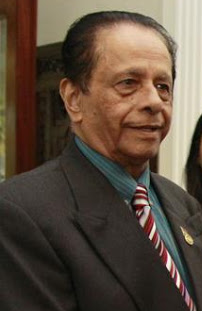Related Research Articles
The known history of Mauritius begins with its discovery by Arabs and Malays,followed by Europeans and its appearance on maps in the early 16th century. Mauritius was successively colonized by the Netherlands,France and Great Britain,and became independent on 12 March 1968.

Sir Anerood Jugnauth,GCSK,PV,was a Mauritian statesman,politician and barrister who served both as President and Prime Minister of Mauritius. He was Member of Parliament for Piton &Riviere Du Rempart. A central figure of Mauritian politics in the 1980s and 1990s,he was Leader of the Opposition from 1976 to 1982. He served four consecutive terms as Prime Minister from 1982 to 1995 and again from 2000 to 2003. He was then elected as President and served as such from 2003 to 2012. Following his party's victory in the 2014 general elections,he served his sixth and final term as Prime Minister becoming the longest serving prime minister with more than 18 years of tenure overtaking Seewoosagur Ramgoolam,who held the office for 14 years.

Sir Seewoosagur Ramgoolam was a Mauritian physician,politician,and statesman. He served as the island's only chief minister,first prime minister,and fifth governor-general.

The Mauritian Social Democratic Party,also known as the Mauritian Conservative Party,is a political party in Mauritius. It is conservative and Francophilic. It is the fourth biggest political party in the National Assembly and forms part of Opposition.

Sir John Pope Hennessy,was an Irish and British politician and colonial administrator who served as the eighth Governor of Hong Kong and the fifteenth Governor of Mauritius.
Sir Abdool Razack Mohamed was an Indian-born former senior Mauritian Minister in the pre and post-independence cabinet of Mauritius.
Indo-Mauritians are Mauritians who trace their ethnic ancestry to the Republic of India or other parts of the Indian subcontinent in South Asia.
Jean Margéot was Mauritian Roman Catholic priest,bishop and cardinal.

Marie Rita Marcelle Lagesse O.S.K was a Mauritian journalist and writer.

General elections were held for the first time in Mauritius between 11 and 20 January 1886. They followed the introduction of a new constitution the previous year. The Democrats and Reformists each won five of the ten elected seats.
The Muslim Committee of Action,also known as the Comitéd'Action Musulman or Comitéd'Action Mauricien (CAM) was a political party in Mauritius.

Sir Charles Gaëtan Duval QC was a barrister,statesman and politician from Mauritius who was the leader of the Parti Mauricien Social Démocrate (PMSD).
Maurice Curé (1886-1977) was one of the founders of the Labour Party in Mauritius in 1936.
Gnanadicarayen Arlanda,more commonly known as Louis Arlanda or Gnanadicarayen Louis Arlanda was a Mauritian politician and businessman. He was the first Indo-Mauritian to become a member of the ruling Council,which was an early form of modern-day National Assembly or Parliament of Mauritius.
Sir Virgile Naz (1825-1901) was a Mauritian lawyer,businessman and politician who was elected in British Mauritius to the Council of the Government of Mauritius,the predecessor of modern-day National Assembly or Parliament.
The Union Démocratique Mauricienne (UDM) was a political party in Mauritius.
Renganaden Seeneevassen was a Mauritian politician and government minister.
The Action Libérale was a political party in Mauritius.
References
- ↑ "Nominated members pioneered by Pope Hennessy". Le Mauricien. Retrieved 2012-09-30.
- ↑ "Histoire: Les premières élections générales opposent Oligarques et Démocrates". Le Mauricien. Retrieved 2011-12-26.
- ↑ "Sir William Newton: genealogy". Geni. Retrieved 2021-03-03.
- ↑ "Sir William Newton: genealogy". Geni. Retrieved 2021-03-03.
- ↑ "Sir John Pope Hennessy and Constitutional Reforms (1956)". Mauritius Times. Retrieved 2020-12-10.
- ↑ "Sir William Newton, instaurateur de la première démocratie mauricienne". Histoires Mauriciennes. Retrieved 2019-05-02.
- ↑ "Mauritian democracy: a caesarean birth". L'Express. Retrieved 2020-12-03.
- ↑ Napal, D. "Glimpses of Mauritian History (1956) The Alleged Indian Peril". Mauritius Times. Retrieved 2017-10-13.
- ↑ "Sir William Newton: genealogy". Geni. Retrieved 2021-03-03.
- ↑ "1948 : Premières élections démocratiques à Maurice". Le Mauricien. Retrieved 2014-12-10.
- ↑ "Histoire: Les premières élections générales opposent Oligarques et Démocrates". Le Mauricien. Retrieved 2011-12-26.
- ↑ "Mauritian democracy: a caesarean birth". L'Express. Retrieved 2020-12-03.
- ↑ "Our men in Mauritius: Lowry Cole and Pope Hennessy". History Ireland. Retrieved 2021-03-03.
- ↑ "Sir William Newton, instaurateur de la première démocratie mauricienne". Histoires Mauriciennes. Retrieved 2019-05-02.
- ↑ "Sir William Newton, instaurateur de la première démocratie mauricienne". Histoires Mauriciennes. Retrieved 2019-05-02.
- ↑ "Sir William Newton: genealogy". Geni. Retrieved 2021-03-03.
- ↑ "The London Gazette (19 December 1905)" (PDF). The Gazette. Retrieved 2021-03-03.
- ↑ "Report of Truth and Justice Commission Vol 1" (PDF). TJC Government of Mauritius. Retrieved 2011-10-15.
- ↑ "William Newton et John Pope Hennessy, précurseurs de la démocratie mauricienne". Defimedia. Retrieved 2018-06-10.